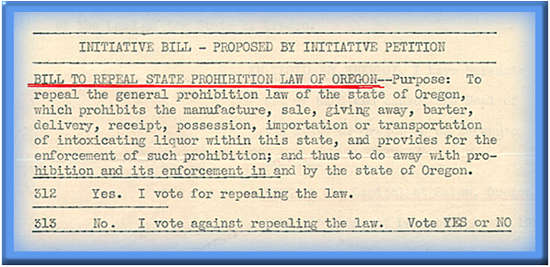

 n both 1925 and 1931 the Oregon Legislative Assembly refused to pass bills
that would have sent to the voters a call to reconsider statewide prohibition.
"Wet" interests finally used the initiative petition to put such a question
before the voters in November of 1932. This initiative was passed by the voters,
effectively eliminating the state's machinery for penalizing infringements of the
prohibition laws (page 1 of vote
proclamation ... page 2). In the
summer of 1933, the voters repealed Oregon's constitutional prohibition amendment, and
shortly thereafter Oregon ratified the 21st amendment to the U.S. Constitution, repealing
national prohibition. n both 1925 and 1931 the Oregon Legislative Assembly refused to pass bills
that would have sent to the voters a call to reconsider statewide prohibition.
"Wet" interests finally used the initiative petition to put such a question
before the voters in November of 1932. This initiative was passed by the voters,
effectively eliminating the state's machinery for penalizing infringements of the
prohibition laws (page 1 of vote
proclamation ... page 2). In the
summer of 1933, the voters repealed Oregon's constitutional prohibition amendment, and
shortly thereafter Oregon ratified the 21st amendment to the U.S. Constitution, repealing
national prohibition.
This did not mark the end of liquor control in the State of
Oregon; almost immediately following the repeal of national prohibition, Governor Julius
Meier began efforts that, by the end of the year resulted in the formation of the Oregon
Liquor Control Commission, or OLCC, which continues selective regulation of liquor
manufacture and sales in the state.

|

